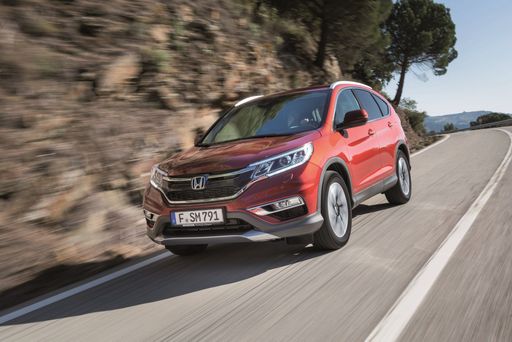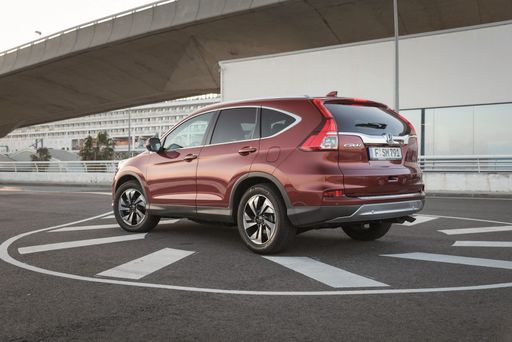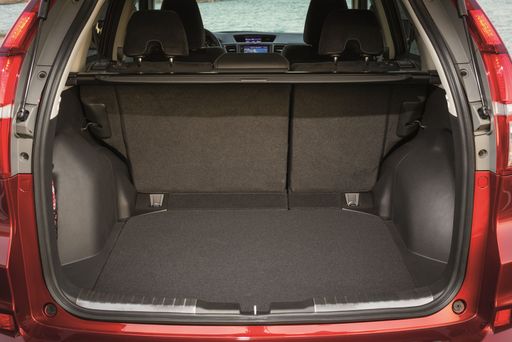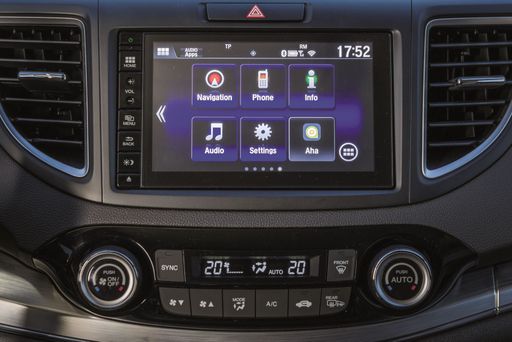Honda CR-V vs Hyundai Bayon – Differences & prices compared
Compare performance, boot space, consumption and price in one view.
Find out now: which car is the better choice for you – Honda CR-V or Hyundai Bayon?
The Honda CR-V (SUV) comes with a Plugin Hybrid or Full Hybrid engine and Automatic transmission. In comparison, the Hyundai Bayon (SUV) features a Petrol engine with Manuel or Automatic transmission.
When it comes to boot capacity, the Honda CR-V offers 617 L, while the Hyundai Bayon provides 411 L – depending on how much space you need. If you’re looking for more power, decide whether the 184 HP of the Honda CR-V or the 100 HP of the Hyundai Bayon suits your needs better.
In terms of consumption, the values are 0.80 L per 100 km for the Honda CR-V, and 5.40 L for the Hyundai Bayon.
Price-wise, the Honda CR-V starts at 42800 £, while the Hyundai Bayon is available from 20100 £. Compare all the details and find out which model fits your lifestyle best!
Honda CR-V
The Honda CR-V presents a blend of practicality and comfort, making it a reliable choice for families and adventure seekers alike. With its spacious interior and refined design, it offers a pleasant driving experience whether in urban environments or on long road trips. This model also boasts a range of advanced safety features, enhancing driver confidence and passenger security.
details @ hondanews.eu
@ hondanews.eu
 @ hondanews.eu
@ hondanews.eu
 @ hondanews.eu
@ hondanews.eu
 @ hondanews.eu
@ hondanews.eu
Hyundai Bayon
The Hyundai Bayon is a compact crossover that effortlessly merges practicality with modern design. Its sleek exterior and spacious interior make it an ideal choice for urban settings and longer journeys alike. With a focus on comfort and connectivity, this vehicle provides a smooth driving experience paired with advanced technology features.
details @ hyundai.news
@ hyundai.news
 @ hyundai.news
@ hyundai.news
 @ hyundai.news
@ hyundai.news
 @ hyundai.news
@ hyundai.news
 @ hyundai.news
@ hyundai.news

|

|
|
|
|
Costs and Consumption |
|
|---|---|
|
Price
42800 - 52100 £
|
Price
20100 - 25800 £
|
|
Consumption L/100km
0.8 - 6.7 L
|
Consumption L/100km
5.4 - 5.5 L
|
|
Consumption kWh/100km
-
|
Consumption kWh/100km
-
|
|
Electric Range
79 km
|
Electric Range
-
|
|
Battery Capacity
-
|
Battery Capacity
-
|
|
co2
18 - 152 g/km
|
co2
124 g/km
|
|
Fuel tank capacity
46 - 57 L
|
Fuel tank capacity
40 L
|
Dimensions and Body |
|
|---|---|
|
Body Type
SUV
|
Body Type
SUV
|
|
Seats
5
|
Seats
5
|
|
Doors
5
|
Doors
5
|
|
Curb weight
1821 - 1988 kg
|
Curb weight
1170 - 1195 kg
|
|
Trunk capacity
579 - 617 L
|
Trunk capacity
411 L
|
|
Length
4706 mm
|
Length
4180 mm
|
|
Width
1866 mm
|
Width
1775 mm
|
|
Height
1673 - 1684 mm
|
Height
1500 mm
|
|
Payload
439 - 475 kg
|
Payload
460 - 465 kg
|
Engine and Performance |
|
|---|---|
|
Engine Type
Plugin Hybrid, Full Hybrid
|
Engine Type
Petrol
|
|
Transmission
Automatic
|
Transmission
Manuel, Automatic
|
|
Transmission Detail
CVT
|
Transmission Detail
Manual Gearbox, Dual-Clutch Automatic
|
|
Drive Type
Front-Wheel Drive, All-Wheel Drive
|
Drive Type
Front-Wheel Drive
|
|
Power HP
184 HP
|
Power HP
100 HP
|
|
Acceleration 0-100km/h
9 - 9.5 s
|
Acceleration 0-100km/h
11.3 - 12.4 s
|
|
Max Speed
187 - 195 km/h
|
Max Speed
176 - 179 km/h
|
|
Torque
335 Nm
|
Torque
172 - 200 Nm
|
|
Number of Cylinders
4
|
Number of Cylinders
3
|
|
Power kW
135 kW
|
Power kW
74 kW
|
|
Engine capacity
1993 cm3
|
Engine capacity
998 cm3
|
General |
|
|---|---|
|
Model Year
2024 - 2025
|
Model Year
2024
|
|
CO2 Efficiency Class
B, D, E
|
CO2 Efficiency Class
D
|
|
Brand
Honda
|
Brand
Hyundai
|
Honda CR-V
Introducing the Honda CR-V: A Modern Marvel in the SUV Realm
Bursting onto the scene with cutting-edge innovation and engineering brilliance, the Honda CR-V continues to mesmerise car enthusiasts and potential buyers alike. As a staple of the SUV segment, the Honda CR-V offers a versatile blend of performance, efficiency, and technology for the discerning driver.
Innovative Powertrains: Hybrid and Plug-In Hybrid Excellence
The heart of the Honda CR-V lies in its advanced hybrid and plug-in hybrid powertrains, featuring a 2.0-litre i-MMD (intelligent Multi-Mode Drive) engine. Producing an impressive 184 PS (135 kW) of power, this system offers robust acceleration, reaching 0-100 km/h in as little as 9 seconds. Depending on the model variant, drivers can choose between front-wheel drive and all-wheel drive configurations, with fuel efficiency ranging from 0.8 L/100 km for the plug-in hybrid to 6.7 L/100 km for the hybrid models. Additionally, the plug-in hybrid version provides an all-electric range of 79 kilometres, ideal for urban commutes.
Masterful Design and Practicality
Measuring 4,706 mm in length and 1,866 mm in width, the CR-V maintains a commanding presence on the road. The vehicle combines sleek aesthetics with practical design, boasting a spacious cabin that comfortably seats five occupants. With a boot capacity extending from 579 to 617 litres, the CR-V offers ample storage for both everyday tasks and grand adventures.
Advanced Technological Features for a Safer Drive
Safety and convenience remain paramount in the latest Honda CR-V, equipped with state-of-the-art technology. The inclusion of Honda SENSING, a suite of driver-assistance systems, ensures enhanced awareness and minimises the risk of accidents. From adaptive cruise control to lane-keeping assist, these features provide peace of mind during every journey.
Efficiency and Environmental Responsibility
Emphasising environmental consciousness, the Honda CR-V models boast a CO2 efficiency class spanning from B to E, with emissions as low as 18 g/km. This aligns with Honda's commitment to reducing environmental impact while providing top-tier performance.
A Premium Driving Experience
Inside, the Honda CR-V presents a refined yet functional interior, with a focus on driver comfort and connectivity. Options include luxurious upholstery, state-of-the-art infotainment systems, and ergonomic controls, ensuring an enjoyable driving experience. Available across various equipment lines such as Advance and Elegance, buyers are given a spectrum of choices to suit individual tastes and requirements.
Conclusion: The Future Looks Bright for Honda CR-V
The 2024 Honda CR-V stands as a testament to Honda's pursuit of excellence in automotive design and engineering. With its hybrid and plug-in hybrid variants, sophisticated safety technologies, and premium features, it signifies a new era of efficiency and innovation. Offering a diverse range of specifications and styles, the CR-V is well-equipped to meet diverse consumer demands, continuing its legacy as a leader in the SUV market.
Hyundai Bayon
Introducing the Hyundai Bayon: A New Era in Compact SUVs
The Hyundai Bayon, a compact SUV designed with urban adventurers in mind, is making waves with its exceptional blend of style, performance, and technology. The brand has pulled out all the stops to ensure that the Bayon stands out in the crowded SUV market, offering a vehicle that is both practical and innovative.
Sleek Design and Cutting-Edge Aerodynamics
The Bayon features a striking exterior design, characterised by its bold lines and angular shapes. With a length of 4180 mm, a width of 1775 mm, and a height of 1500 mm, the Bayon commands attention with its modern appeal and aerodynamic efficiency. These dimensions not only contribute to its sleek design but also enhance fuel efficiency, achieving an impressive 5.4 L/100 km.
Engine Performance and Specifications
Under the bonnet, the Bayon is powered by a 1.0-litre T-GDI petrol engine, delivering a robust 100 PS or 74 kW. This engine is available with either a manual or automatic gearbox, meeting varied driver preferences. The front-wheel-drive system complements its urban-centric design, ensuring a smooth and responsive ride.
Maximised Interior Space and Comfort
The spacious interior of the Bayon accommodates up to five passengers comfortably. The vehicle boasts a boot space of 411 litres, perfect for both everyday use and weekend getaways. The cabin is designed with practicality and technology in mind, with intuitive controls and ample storage options.
Advanced Technology and Connectivity
Hyundai has equipped the Bayon with state-of-the-art technology to enhance the driving experience. The SUV features a high-resolution touchscreen, offering seamless connectivity with Apple CarPlay and Android Auto. Safety is also a priority, with multiple driver assistance systems including lane-keeping assist and forward collision avoidance assist.
Environmental Efficiency
Despite its powerful performance, the Bayon achieves a respectable CO2 efficiency class of D, with emissions as low as 122 g/km. This balance between performance and environmental responsibility makes the Bayon an attractive option for conscientious drivers.
Affordability and Market Appeal
The Hyundai Bayon is competitively priced, ranging from €22,900 to €29,600. Its affordable running costs, estimated at 32.3 to 36.4 cents per kilometre, further enhance its appeal to budget-conscious consumers. With monthly costs ranging from €806 to €909, the Bayon provides excellent value without compromising on features or performance.
Final Thoughts
The Hyundai Bayon truly stands out in the compact SUV segment, combining style, innovation, and practicality in an appealing package. It offers a versatile driving experience suited to the demands of modern urban living, making it a top contender in its class. As Hyundai continues to champion forward-thinking design and technology, the Bayon is a testament to the company's ongoing commitment to excellence.
The prices and data displayed are estimates based on German list prices and may vary by country. This information is not legally binding.
